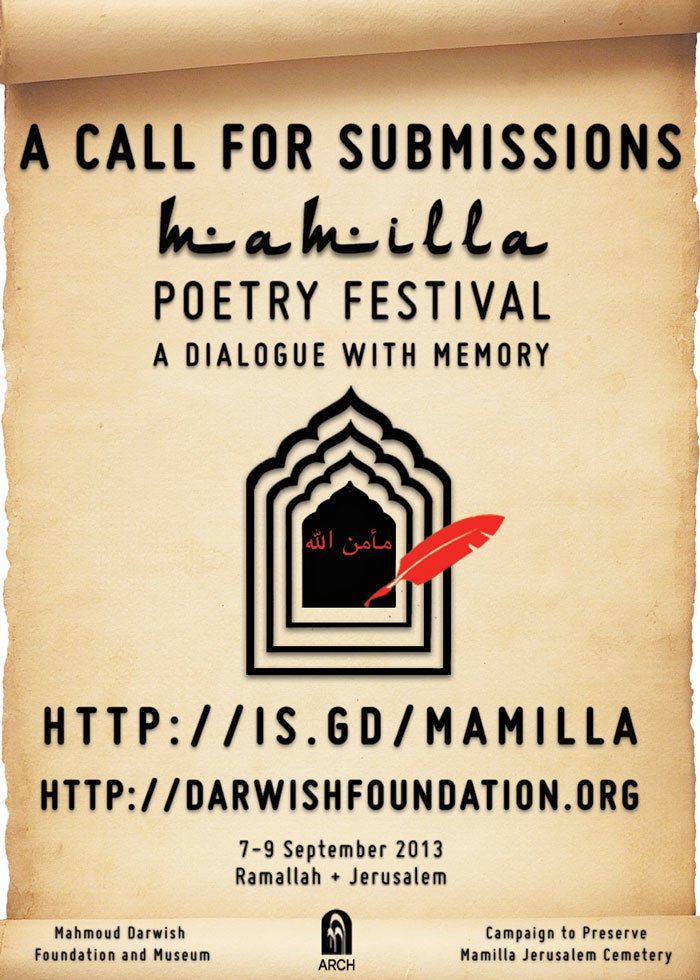The Mamilla International Poetry Festival
7 - 9 September 2013
Ramallah & Jerusalem
Encouraged by renewed hope for the preservation of the ancient Mamilla Cemetery, ARCH joins hands with the Mahmoud Darwish Foundation and Museum and the Campaign to Preserve Mamilla Jerusalem Cemetery in organizing the Mamilla International Poetry Festival.
ARCH (Alliance to Restore Cultural Heritage in the Holy City of Jerusalem), the Mahmoud Darwish Foundation and Museum, and the Campaign to Preserve Mamilla Jerusalem Cemetery announce an Open Call for Submissions for the Mamilla International Poetry Festival, to take place in Ramallah and Jerusalem between September 7 – 9, 2013.
The festival, whose theme is “A Dialogue with Memory,” was conceived to protect the ancient Mamilla Cemetery from complete and final destruction by invoking poetry to promote it as a place of living memory and eternal sanctity.
During a three-day period, poetic vigils, performances, and readings—both live and virtual—will invoke, imagine, invigorate, and illuminate the lives and memories of those buried in the cemetery.
Inspired by Seamus Heaney’s claim that every poet has double citizenship—one of locality and one of conscience—the festival invites poets of all beliefs, faiths, and nationalities to reflect upon and explore universal themes (such as location, citizenship, ancestry, and collective memory) that transcend geographical boundaries. Poetry that celebrates Mamilla as a resting place for notables, ordinary citizens, and generations of Palestinian families is welcome, as are submissions that engage in a poetic discourse with both the living and the dead.
All submissions must be received by May 31, 2013. A panel of six distinguished international literary figures will review all content to select twenty final submissions, which will then be performed live (or digitally broadcast) at the Mahmoud Darwish Foundation and Museum in Ramallah. The festival will be documented and streamed online and an anthology will be published upon its culmination. Circumstances permitting, the festival will conclude with a candlelight reading of Mahmoud Darwish’s poetry in Mamilla Cemetery and/or at other vulnerable cultural sites in the Holy City of Jerusalem.
In addition to soliciting international participation and generating global awareness, the festival will also galvanize local communities: A special prize will be awarded for the best poem submitted by a secondary school student and local youth will be encouraged to participate and attend.
Poetry’s crucial role in the formation of cultural identity is undeniable, especially when it provides agency in the preservation of memory. As Mahmoud Darwish affirmed, “Poems can’t establish a state. But they can establish a metaphorical homeland in the minds of the people. I think my poems have built some houses in this landscape.”
About Mamilla Cemetery:
Resting just west of the walls of the Old City of Jerusalem, Mamilla Cemetery—ancient necropolis of shrines, of mausoleums, and of modest graves—is facing complete desecration and final destruction.
Mamilla’s venerable history is as rich as it is layered. Having first been adopted by the Byzantines, whose 4th century church and cemetery marked it a holy ground, Mamilla was then designated an Islamic burial site as early as the 7th century, when the remains of the very first Muslims, the Sahabah—companions of the Prophet Muhammad—were reputedly laid to rest in its sacred soil. Aside from a brief period as a Christian cemetery during the Crusades, Mamilla served without interruption as a Muslim burial ground over the course of a 1,400 year-period of Islamic rule over Jerusalem. Growing to become the largest Islamic cemetery in the city, it housed a diverse community of Muslims, from the respected soldiers of ruler Saladin to generations of Jerusalemites spanning a wide socio-economic spectrum. Tombs of emirs, muftis, Sufi shrines and Mamluk-era mausoleums—amongst other ancient monuments and gravestones—further attest to its hallowed history. So holy was Mamilla, in fact, that in the 14th century A’lam, interment there was likened to being buried in heaven.
Today, Mamilla stands not only as a symbol and vestige of Palestinian—and Muslim—cultural heritage, but also as a site of exceptional universal value. In light of its sacred nature and historical significance, the cemetery—and the memories and identities of those buried within it—deserves to be honoured, protected, and preserved.
Click here to download application information and forms may be downloaded here.
For more Information:
- ARCH on Facebook
- Mahmoud Darwish Foundation and Museum
- Campaign to Preserve Mamilla Jerusalem Cemetery
Social Media Information:
- Facebook Open Call Event Page: http://is.gd/mamillaFBcall
- Suggested Twitter hashtags: #mamillapoetry, #mamillacemetery
Festival Contacts:
- Maryvelma Smith O’Neil, ARCH Jerusalem, info@archjerusalem.org
- Raneen Hadeed, Mahmoud Darwish Foundation, raneen@darwishfoundation.org
Media Contact:
- Kateri O’Neil, Aesthetics Unlimited, kateri@aesthetics-unlimited.com
